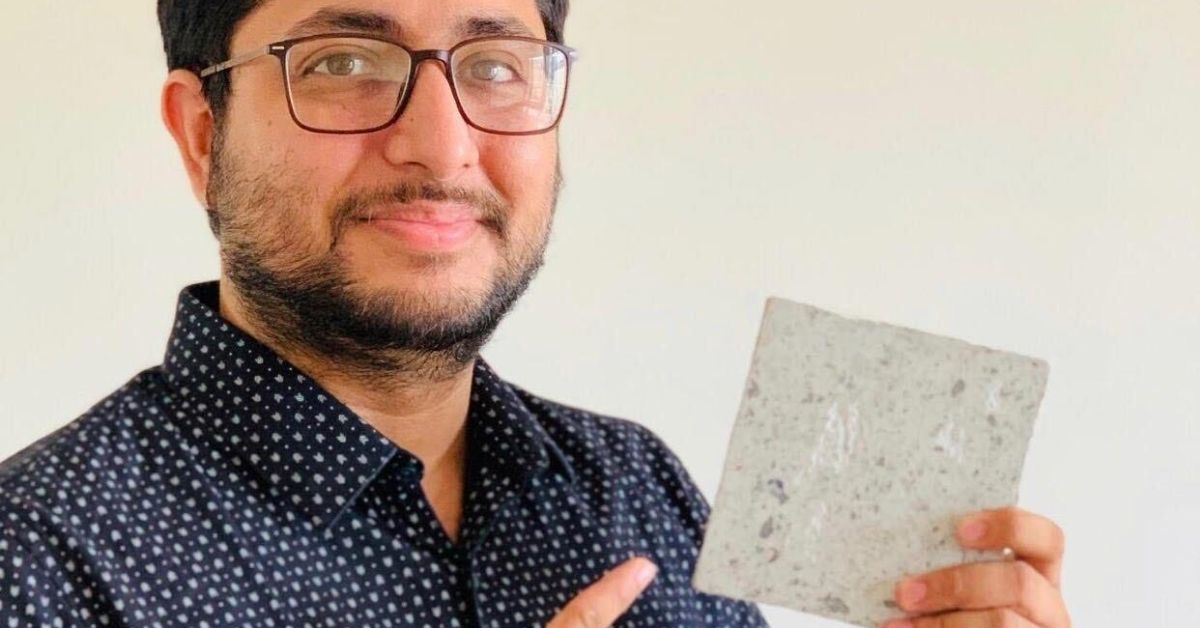Binish Desai is a Gujarat-based innovator popularly known as the Recycle Man of India. He is the founder of the company BDream which is focused on designing technologies to recycle industrial waste to make sustainable building material.

After his earlier innovation, P-Block bricks, that were made from waste produced in paper mills, he has come up with another similar product — P-Block 2.0. The difference is that these bricks are made from COVID-19-related biomedical waste.
According to a report by the Central Pollution Control Board (CPCB) in the National Green Tribunal, India generates about 101 Metric Tonnes per day (MT/day) of COVID-19 related biomedical waste. This quantity is in addition to the normal biomedical waste generation of about 609 MT/day.
“Facemasks are the new normal, and single-use face masks are widely used. But, once they are disposed of, they end up in a landfill. So, I thought why not try to incorporate this with the bricks I am already making,” says Binish.
About the P-Block 2.0
The bricks are made using 52% of shredded PPE material, 45% paper sludge, and 3% binding agent-formulated gum base.
“The process of making the brick is similar to the P-Block, and I added PPE made from non-woven fabric which includes masks, gowns, and head-covers. I started experimenting with the method in my home-lab, and soon made a few in my factory,” says Binish.
Once it was successful, he sent some bricks across to a local laboratory to get his product tested and approved.
“We could not approach national-level labs for certification owing to the pandemic. But we got it approved from a government-accredited laboratory. During the prototype testing, it passed all the tests for durability, and even surpassed expectations on the quality,” says Binish.
Each brick is 12 x 8 x 4 inches in size, and it uses 7 kg of biomedical waste per square foot. Binish claims it is lighter, and stronger compared to the P-Block 1.0. It is also waterproof and fire-resistant, and costs Rs 2.8 per piece.
Waste Collection Process
Binish hopes to start full-fledged manufacturing from September, and source the biomedical waste from hospitals, schools, salons, bus stops, and other public places by placing ‘Eco Bins’. These are meant only to collect non-woven PPE waste.
The bins will have an indication mark to show that it is full. Once it reaches that mark, the waste is left untouched for the next 72 hours, and then it will be disinfected thoroughly. Once that is done, it is shredded, added along with paper sludge and the binding agent.
“We are in the process of obtaining NOC (no objection certificate) and collaborating with government institutions to set up the bins in public spaces with high footfall,” he says.
Lakshmi Menon, an eco-innovator based in Ernakulam, Kerala, and the founder of Shayyas — beds made from scraps of the material used to make PPE gowns — says “These kinds of innovations are the need of the hour. The pandemic has given way for a new kind of waste to get accumulated, and ideas like these are what will protect the environment from getting even dirtier. Whenever there is a crisis, there is also an opportunity hidden in it.”
If you wish to know more about the P-Block 2.0, you can get in touch with Binish at b.ecoeclectic@gmail.com.
Image courtesy: Binish Desai
(Edited by Gayatri Mishra)
We bring stories straight from the heart of India, to inspire millions and create a wave of impact. Our positive movement is growing bigger everyday, and we would love for you to join it.
Please contribute whatever you can, every little penny helps our team in bringing you more stories that support dreams and spread hope.

